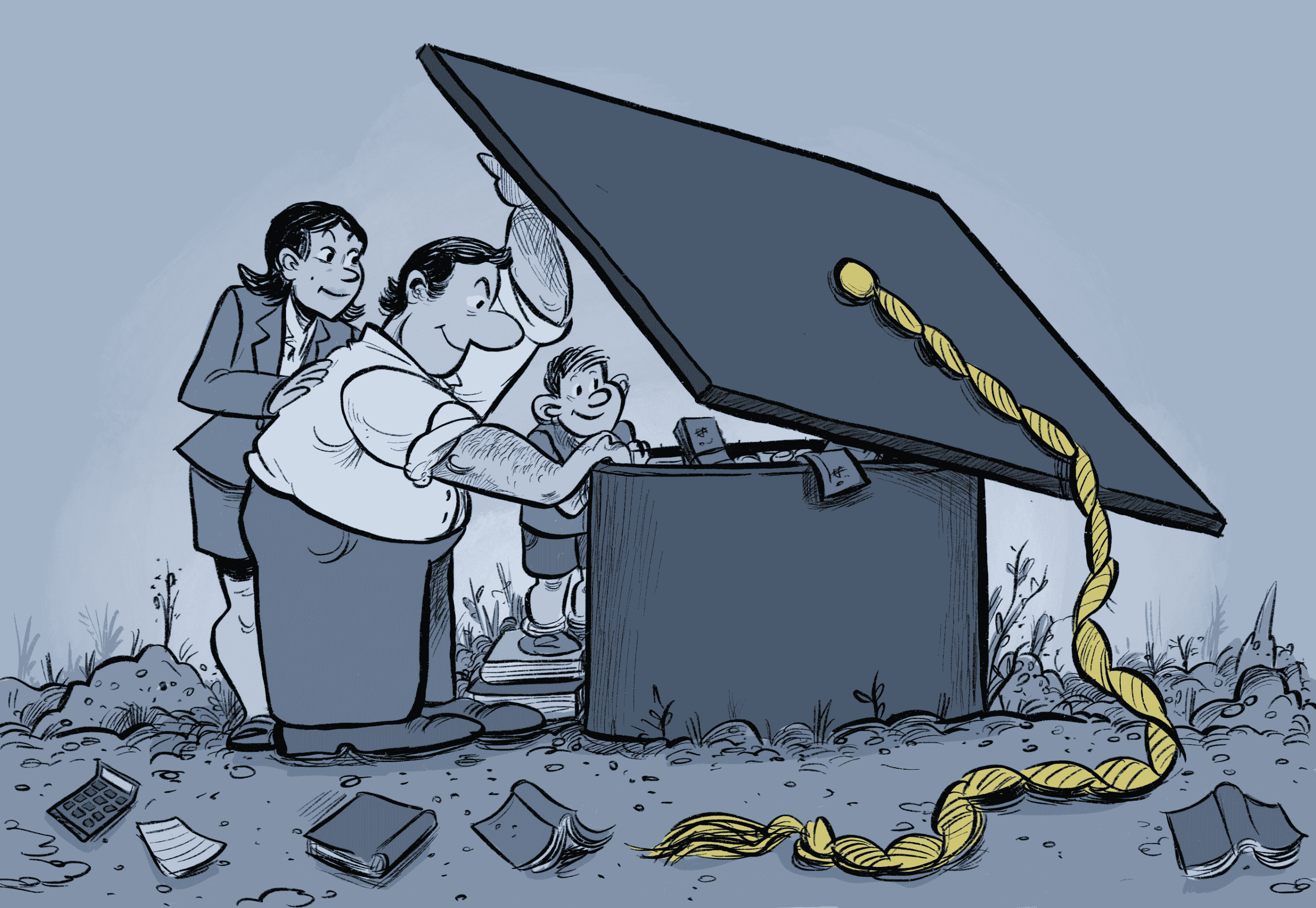
Careers and kids: What’s your RESP return on investment?
A doctor? A lawyer? Maybe a software engineer? Who knows what path your child may pursue. We break down the economics of some popular career paths so you can ask: How can I help?
Parents often have strong ideas about what their children should do following high school. Whether you believe the ideal path involves a bachelor’s degree or a diploma, most of us just want to help our kids reach their full potential.
According to Mindi Banach, Tax and Estate Planner, TD Wealth, the first step toward this goal is to make a plan. “Incorporating your child’s education into your long-term financial plan can help ensure you’re able to pay for it.”
While you put away funds, you may have some lingering questions: How aggressively should you save if you have a highly ambitious and intelligent kid to educate? Which post-secondary pursuits are suitable for them? What careers are going to bring your student the most money? And what’s it going to take to get those jobs?
While a lot will depend on your own child’s passion and personal commitment, there’s much you can do today as parents to be prepared with some answers to those questions. Let’s dive in.
The case for post-secondary success…and happiness
While parents can have a certain influence on their kids, the kids have the ultimate say when it comes to what they do with their own lives. Having said that, if we look at population data, it’s clear that having at least some form of higher education can be beneficial. According to a study by the Bank of Canada, Canadians who hold post-secondary accreditation earn 18% – 52% more than those who don’t. 1 And that’s been the case since the early 1990s.
So what’s changed in the last 30 years? Well, for one, more people hold post-secondary degrees now than they did back then — improved access to higher education has helped open the door to more career options. 2 Perhaps unsurprisingly, those who hold “education-intensive” jobs (doctors, lawyers, etc.) continue to enjoy the most significant boost to their earning potential (up to 74% more). 3 For others, the earning boost is still there, it’s just not as big as it once was.
While higher education = success certainly makes for a very tidy equation, it ignores a key factor. Namely, your child’s happiness. The argument goes: If your kid is happy, does it really matter what they end up doing? In fact, Behavioural Economics researchers suggest that overall happiness is highly correlated with our economic well-being. Essentially, the more money you make, the more you are likely to report greater feelings of life satisfaction — although there is ongoing debate on whether your happiness level plateaus after you have a certain level of money. 4 While other factors may play a role in determining happiness, it seems securing a higher education can pay off in more ways than one.
Five lucrative careers (and what they cost)
To help illustrate what a degree could mean for your child in a more practical sense, we’ve broken down five popular career choices that require at least some form of higher education. In this breakdown, we explore the expected salary of each job and the level of education required. Keep in mind, while income levels are high for some of these roles, parents and children may also want to consider intangibles like job-related stress and work-life balance in addition to salary when helping a student make decisions about the future. Salaries, education and certification requirements for each role cited were sourced from the Government of Canada’s Job Bank database.
Family Doctor
When you think about high-paying jobs in Canada, a doctor may come to mind. And for good reason — physicians are some of the highest-paid professionals in this country. Although the long-term benefits are significant, the schooling required is quite laborious.
Low/starting salary: $76,759 (residency included)
Top salary: $472,548
Education required: Bachelor’s degree, typically a Bachelor of Science, followed by acceptance and graduation from a recognized medical school.
Other requirements: Medical school graduates must complete a medical residency program lasting 2 – 3 years, pass a final examination required by the Medical Council of Canada and be licensed by the appropriate governing body within their province or territory in order to practice.
Education costs:
Bachelor of Science: $26,500 (four-year program, tuition only)
Medical school: $60,000 – $104,000 (four-year program)
MCAT exam: US$330 (CDN$443)
Total cost: $86,943 – $130,943
Lawyer
Like a doctor, a lawyer’s career path involves extra schooling beyond a bachelor’s degree. However, holding a law degree in Canada can open many doors (including to other careers) and therefore remains a popular choice for many post-secondary students.
Low/Starting salary: $37,347 (articling included)
Top salary: $479,922
Education required: Bachelor’s degree followed by a law degree from a recognized law school. Applicants to law school have to pass the Law School Admission Test (LSAT).
Other requirements: Once students have graduated from law school, they must sit for their provincial or territorial bar examination and complete a specified period of articling. While practicing, they must also be licensed and registered with their provincial or territorial law society.
Education costs:
Bachelor’s degree: $26,500 (four-year program, tuition only)
Law school: $51,000 – $102,000 (three-year program)
LSAT exam: US$222 (CDN$298)
Total cost: $77,798 – $128,798
Software Designer
Software designers and engineers typically design, integrate and maintain software operating systems for different firms across both public and private sectors. A recent report from the Council of Canadian Innovators suggests that by 2025, employment in the digital economy will reach 2.26 million — approximately 11% of all employment in Canada. 5 It’s one of our fastest growing fields.
Low/Starting salary: $61,443
Top salary: $171,600
Education required: A bachelor’s degree in some form of computer science is generally required. A master’s or doctoral degree in a related discipline may be required depending on the role.
Other requirements: Licensing by a provincial or territorial professional engineering authority may be necessary for software engineering roles.
Education costs:
Bachelor’s degree: $26,500 (four-year-program, tuition only)
Master’s degree: $9,400 (two-year program)
Total cost: $35,900.
Industrial Electrician
Certification in a skilled trade is another form of higher education. Many tradespeople earn substantial salaries with significant growth potential over time, and it may be a good fit for young adults who don’t see themselves filling a typical nine-to-five job.
Low/Starting salary: $53,331
Top salary: $125,840
Education required: Completion of a four- or five-year apprenticeship program, as well as some trades school, college or industry courses.
Other requirements: Trade certification may be required depending on the province or territory.
Education costs:
Electrician apprenticeship: $6,000 (four-year program)
Total cost: $6,000
Mining Engineer
There are a variety of options available for those interested in becoming engineers, and role specifics will vary considerably. However, the basic educational requirements are often comparable. Mining engineers plan, design and supervise the development or running of mine facilities or systems.
Low/Starting salary: $52,998
Top salary: $168,001
Education required: A bachelor’s degree in mining engineering or in a related engineering discipline is required. A master’s or doctoral degree may be required, depending on the position.
Other requirements: Licensing by a provincial or territorial professional engineering authority is required to practice as a Professional Engineer (P. Eng.). Candidates may be eligible following a three- to four-year supervised work term and professional examination.
Education costs:
Bachelor’s degree: $26,500 (four-year program, tuition only)
Master’s degree: $7,500 – $9,400 (two-year program)
Total cost: $34,000 – $35,900
How can I help my kid get a higher education?
In Canada, the cost of attending a post-secondary institution has risen dramatically over the past several decades. Tuition fees have skyrocketed by as much as 50% – 60% since 2007 alone. 6 And that’s not even factoring in the cost of textbooks, housing, food and transportation. All in, you can expect your child to pay around $20,000 per year for the privilege of graduating from university or college — a number that will likely increase as time goes on. 7
So, how are parents saving the $80,000-plus required for a single four-year degree? (Or $160,000 for two kids?) When it comes to education savings, Banach says the federal government’s Registered Education Savings Plan (RESP) is typically a good place to start. The program allows parents (as well as other sponsors) to contribute up to $50,000 per child to a special savings account on a tax-deferred basis. Unfortunately, even if you’re able to comfortably max out your contribution room and invest the funds so they can continue to grow, you may still need more.
“Ultimately, it’s a balancing act,” says Banach. “Not everyone will be able to maximize every account, so creating a plan becomes very important for those with specific life goals.” To learn more about RESPs, see RESP Checklist: What parents need to know from birth to graduation.
Naturally, the earlier you begin to think about saving for your child’s education, the better. Whether your plan involves applying for a number of scholarships and bursaries or setting up an additional investment account to cover the extra costs, preparation is key.
Something else to keep in mind: Historically, the data shows that those who have invested over a longer period of time have benefitted from higher returns compared to those who enter the market later. Whether you plan to invest incrementally or via a series of lump sums, it can really help to get started early.
If you have questions about saving for post-secondary education, speak to your wealth advisor.
TAMARA YOUNG
MONEYTALK
ILLUSTRATION
DANESH MOHIUDDIN
- “Learning and earning: The payoffs of higher education,” Bank of Canada (last modified June 20, 2022) https://www.bankofcanada.ca/2020/10/learning-and-earning/. ↩
- Ibid ↩
- Ibid ↩
- Michelle W. Berger, “Does more money correlate with greater happiness?” PennToday, March 6, 2023, https://penntoday.upenn.edu/news/does-more-money-correlate-greater-happiness-Penn-Princeton-research. ↩
- Daina Lawrence, “These three sectors are poised for the biggest growth as Canada’s population booms,” The Globe and Mail, October 28, 2022, https://www.theglobeandmail.com/business/article-these-three-sectors-are-poised-for-the-biggest-growth-as-canadas/. ↩
- Jason Kirby, “The case for raising RESP limits to keep pace with soaring inflation,” The Globe and Mail, February 21, 2023, https://www.theglobeandmail.com/business/article-resp-limits-inflation/. ↩
- Mark Brown, “The cost of a Canadian university education in six charts,” Maclean’s Education, November 11, 2022, https://education.macleans.ca/financial-tips/the-cost-of-a-canadian-university-education-in-six-charts/. ↩
















